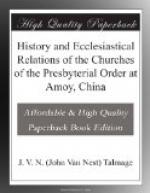Suppose by some means suspicion should arise at home concerning the orthodoxy or morality of one or more of your Missionaries. On the plan proposed, what can the Church do with them? May the Board of Missions, on mere report or suspicion, recall them without giving them a proper trial? Can the Board try them? No. It is not an ecclesiastical court. Will the Church be satisfied with the decision of a court, a majority of whose members have recently been converted from heathenism through the instrumentality of these very Missionaries? But continue the plan of the Missionaries and all will be simple. If any of the Missionaries give occasion for suspicion, let them be tried by their proper Classes in this country. This is all that the Church at home can do ecclesiastically towards keeping the Church pure in China. Whether the proposed nominal union be consummated or not, the only hold you will have on the Chinese churches will be through your Missionaries. If they will not receive the instructions, and listen to the advice of your Missionaries and of the Synod through them, you would not expect them to obey the injunctions of Synod. Your only other resort will be to withhold from them help. Can you not do the same now?
But in all this discussion, I fear, we lose sight too much of our dependence on the Head of the Church to keep His Church pure. Sure I am that the Church in China cannot be kept pure by legislation on this, the opposite side of the globe. But we expect Christ to reign over, and the Holy Spirit to be given to the churches, and the proper ecclesiastical bodies formed of them in China as well as in this land. Why not? Such are the promises of God. The way to secure these things is by prayer, and the preaching of the pure gospel, not by legislation. Let the Church be careful in her selection of Missionaries. Send only such as she has confidence in—men of God, sound in the faith, apt to teach—and then trust them, or recall them. Don’t attempt to control them contrary to their judgment. Strange if this, which is so much insisted on as the policy of our Church, be right, that she cannot get a single man, of all she sends out to China, to think so. Can it be that the Missionary work is so subversive of right reason, or of correct judgment, or of conscientiousness, that all become perverted by engaging in it?
2. Another supposed advantage is the effect it will have in enlisting the sympathies of the Church in behalf of the Mission at Amoy. It is said, tell the Church that we have a flourishing Classis at Amoy, a part of ourselves, connected with General Synod, just like all the other Classes of our Church, the effect will be wonderful in enlisting sympathy, money, and men in behalf of that Mission; otherwise the opposite evil must be apprehended. If these things be so, they are indeed of grave importance. The Mission in China cannot live without the sympathy of the Church at home. But are these things so?




